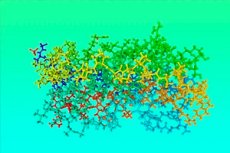New publications
Breakthrough in aging research: blocking IL-11 prolongs life and improves health
Last reviewed: 02.07.2025

All iLive content is medically reviewed or fact checked to ensure as much factual accuracy as possible.
We have strict sourcing guidelines and only link to reputable media sites, academic research institutions and, whenever possible, medically peer reviewed studies. Note that the numbers in parentheses ([1], [2], etc.) are clickable links to these studies.
If you feel that any of our content is inaccurate, out-of-date, or otherwise questionable, please select it and press Ctrl + Enter.

A recent study published in the journal Nature used mouse models and various pharmacological and genetic approaches to examine whether pro-inflammatory signaling behaviors involving interleukin (IL)-11, which activates signaling molecules such as extracellular signal-regulated kinase (ERK) and mTORC1, are associated with poor health and shortened lifespan.
Research shows that hallmarks of aging such as inflammation, cellular senescence, and mitochondrial dysfunction are associated with disruptions in pathways involving signaling molecules such as ERK, mTORC1, AMP-activated protein kinase (AMPK), and serine/threonine kinase 11 (STK11). Metabolic health in aging organisms is linked to the AMPK-mTORC1 axis, and inhibiting mTOR in mice has been shown to extend their lifespan.
Studies in animal models such as fruit flies, yeast, and worms have investigated lifespan extension. However, the findings from these studies cannot be directly applied to health improvement, as lifespan extension is not equivalent to health improvement. It is therefore important to examine the effects of different interventions on lifespan and health separately. Mice are suitable models in this regard, as they exhibit aging pathologies similar to those in humans.
Chronic sterile inflammation is a hallmark of a dysfunctional immune system and one of the key features of aging. Interventions targeting pro-inflammatory cytokines may positively impact life expectancy and quality of life.
The researchers hypothesized that IL-11, a pro-fibrotic and pro-inflammatory cytokine belonging to the IL-6 cytokine family, may be involved in pathologies associated with aging and shortened lifespan. They based this hypothesis on the role of IL-11 in activating the ERK-mTORC1 and JAK-STAT3 pathways.
For this study, the researchers used mouse models and human hepatocyte cultures. Primary human hepatocytes were cultured and stimulated with IL-11 for various periods of time. Supernatants from these cells were used for assays using an inflammatory panel consisting of 92 proteins.
Human cardiac fibroblasts treated with immunoglobulin G (IgG) or X209, a neutralizing antibody targeting the alpha subunit of the IL11 receptor (IL11RA), were also used for high-throughput phenotyping.
Three strains of mice were used for the experiments: mice with the interleukin 11 receptor gene (IL11RA1) deleted, mice with the IL11 gene deleted, and mice with the EGFP gene inserted into the IL11 gene. These mice were subjected to various treatments such as IL-11 deletion and administration of anti-IL-11 antibodies, and were used to evaluate metabolic parameters, physiological traits, and lifespan.
The study found that IL-11 expression was increased in a variety of cell and tissue types in aging mice, and that deletion of the gene encoding IL-11 or the alpha-1 subunit of the IL-11 receptor protected the mice from metabolic decline, frailty, and multimorbidity as they aged.
Additionally, administration of anti-IL-11 antibodies to mice aged 75 weeks or older for 25 weeks improved muscle function, increased metabolism, decreased levels of aging biomarkers, and reduced frailty. Deletion of the IL11 gene increased the lifespan of mice by an average of 24.9%, and treatment of 75-week-old mice with anti-IL-11 antibodies increased the median lifespan of males and females by 22.5% and 25%, respectively.
It was also observed that inhibition of IL-11 significantly reduced the incidence of age-related cancers and tumors.
The results highlight the detrimental role of the pro-inflammatory cytokine IL-11 in mammalian lifespan and quality of life. The study found that anti-IL-11 antibodies improved metabolic parameters and muscle function and reduced cancer incidence in mice. These findings suggest that therapeutic targeting of IL-11 may be valuable in cancer therapy and the treatment of fibrotic lung diseases.
